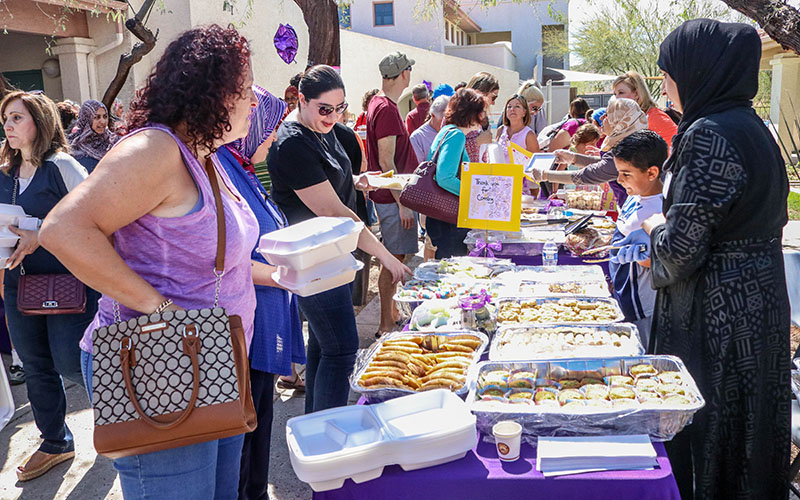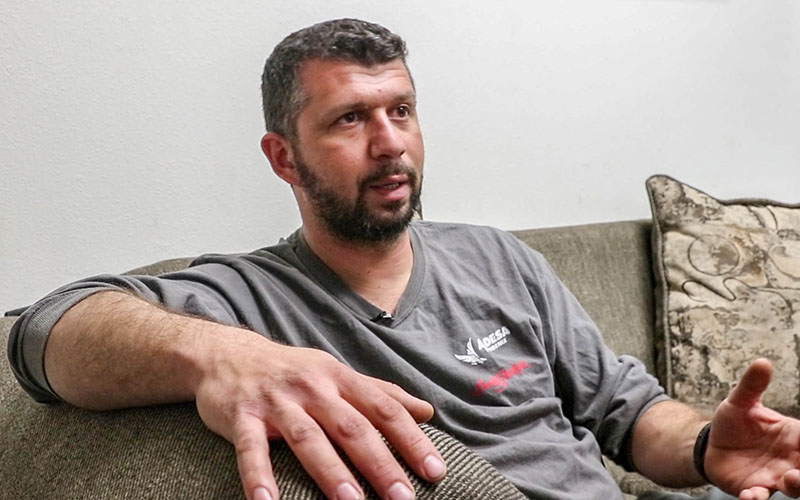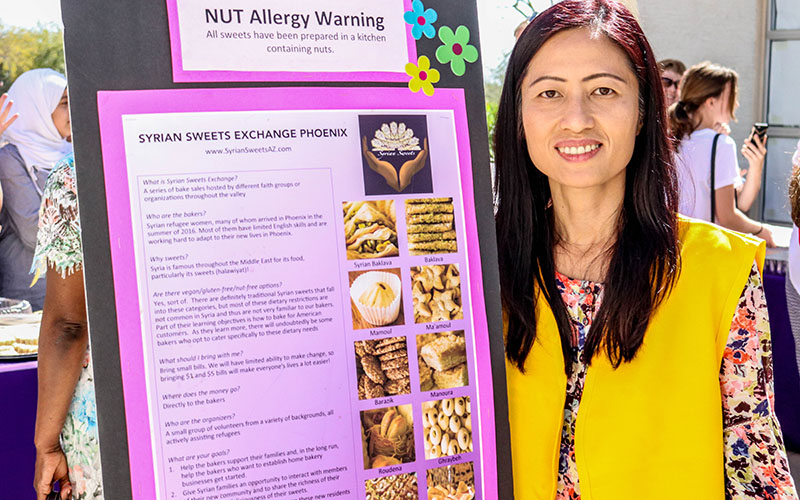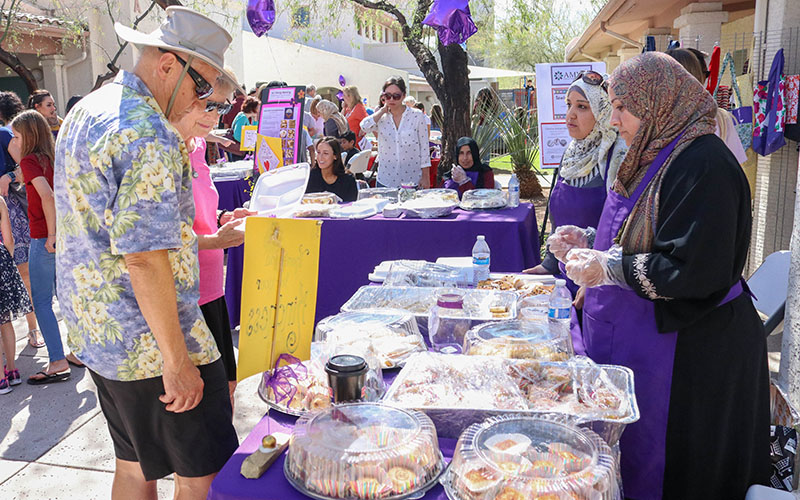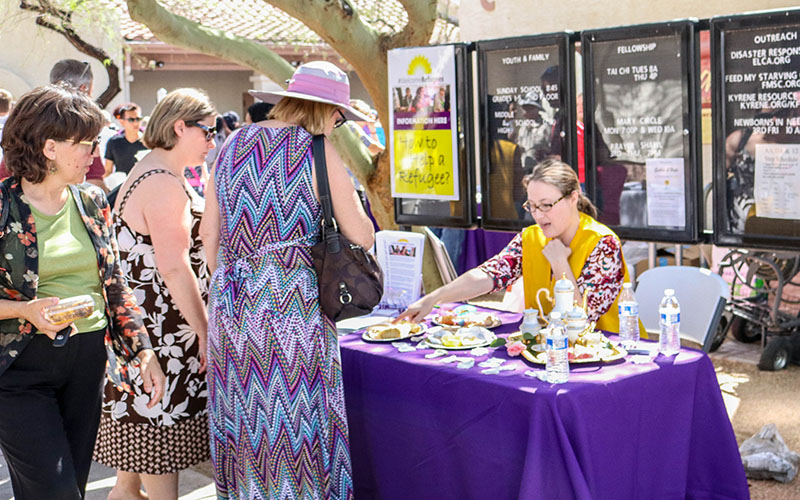- Slug: BC-CNS-Syrian Assist,2280
- Graphics refugees by religion, by relocation state available (embed codes below)
- Photos, video available (thumbnails, captions below)
By SAEED ALSHAMISI
Cronkite News
PHOENIX — While tensions against Muslims in the United States keep growing, Nidal Fayad and Tan Jakwani have taken it upon themselves to help recently arrived Syrian refugees transition to life in Arizona.
In 2016, Fayad stepped down as chairman of the board of directors at the Islamic Community Center in Tempe and became the New Muslim Program coordinator, a position he created himself, to address the refugee crisis.
“We saw a need. The refugees were being shuffled around between different refugee settlements by the organizations, and nobody was giving them enough attention. So I enlisted some of my employees, and we went out to help,” Fayad said.
Fayad’s program focuses on Syrian refugees during their first three months in the United States, before they receive Social Security cards. Because the refugees live on food stamps and the agencies cover only two to three months of rent, Fayad’s main goal is to make sure their basic needs are met.
“I find that people don’t have hygiene items like toothpaste or shampoo, or household items like toilet paper and dishwashing liquid. It’s the little things we take for granted that these refugees are doing without,” Fayad explained.
Jakwani, one of the seven founding members of the Syrian Refugee Connection Facebook Group, has been helping refugees in the Phoenix area for the last nine years. Like Fayad, in 2016 she saw a crisis when an influx of Syrian refugees made it hard for resettlement agencies to reach all the families effectively. She and her community partners also realized that these families needed basic supplies to survive and get on their feet.
Working mainly with the Islamic Center of North East Valley in Scottsdale (an organization that also donates to Fayad’s program), Jakwani and others began to post to Facebook asking for items like furniture and slightly worn clothing. The group helped connect donors with the families in need. This Facebook exchange eventually grew into the Syrian Refugee Connection.
Jakwani explains that the there are so many Syrian refugees coming to Arizona, it is easy for many to fall through the cracks. Catching those families and getting them back on their feet is the reason programs like the New Muslim Care & Education and the Syrian Sweets Exchange were established.
The life of a refugee in the United States is not easy. Sameh Hassan Asfour said that when he and his family first arrived, they were moved from place to place and left alone in hotel rooms for days without anyone telling them what the future held. He said they had no control over how or when they were moved and lost five of the six bags they brought with them from Jordan.
Asfour said the Phoenix neighborhood in which they were resettled was “a dirty and dangerous area, with dogs and cats roaming the streets in packs.” He also claims his seven-member family had to live for two months on $200 and food stamps.
Fortunately, Asfour met Fayad who, besides his work at the Islamic Center, owns Fayad Auto in Tempe. Fayad offered to teach Asfour how to detail cars and give him a job as soon as he received his Social Security card.
“I introduced myself to Nidal on Saturday and started work on Tuesday. It was a great opportunity,” Asfour said. “I cannot describe the extent of the kindness that I’ve found in him; he is a magnificent person. He opened that door for me. That’s all by the help of Allah, then Fayad.”
Fayad trained Asfour in detailing and polishing cars and helped move his family out of their neighborhood.
“We have come to Tempe and met kind people. I’m working and trying as much as possible to seek for a better life. I am doing my best to cover my expenses,” Asfour said.
Even with the support of Fayad, Asfour still struggles to take care of his family. Like many new refugees, Asfour came to the United States expecting a better life than the one he found.
“You must be a hard worker and care for your children well because life here is not like the life back home. I didn’t see America as I imagined it,” Asfour said. “When we thought of America, we thought we were stepping forward. But when I moved here, I saw other things. Even the work is not that kind of good work I had back home, but I am doing my best, working 10, 15, 20 hours a day.”
When asked by friends back in Syria whether they should emigrate to the United States, Asfour understands their pain and why they would want to move here, but he makes sure they understand that it is a life of hard, constant work with little reward.
“I told them to come because life in America is unlike the life in Arab countries. I am telling truly, but you need to work, there is no help, no time for resting. You must work as soon as you arrive and will have no time with your family.”
Asfour also has found it difficult to find the time to learn English. He and his wife have downloaded apps on their phones and have received some help from volunteers, but when he wanted to take classes and study the language to improve his chances for getting a job, Asfour found himself in a bind. Agencies offer English language classes, but it takes three hours for Asfour to reach the agency by bus, and he needs to work to make money.
“They have open classes, but how can we learn instead of working to pay our expenses and rent … how? If you can, tell me how can I learn and work at the same time?” Asfour asked.
Asfour’s hope and joy now are his children. When the family moved to Tempe, Fayad helped enroll Asfour’s children at Noor Academy, an Islamic school, where they are now excelling.
“When I was young, my dream was a house. I built that house, but our president has demolished it. My dream now is to see my children do well,” Asfour said. “I want my oldest son to become a doctor and his siblings to become well educated with high degrees.”
Asfour still has plenty of anxiety about how to help his children achieve that success in the United States when so much seems to be working against them. Next year, Asfour’s oldest son will enter high school.
“I don’t know how I can provide him what he needs. He needs a laptop, a mobile phone, clothes, an allowance,” Asfour explains. “May Allah help me!”
Fayad acknowledges how difficult the life of a Muslim refugee like Asfour is in the United States. He also said that it is getting worse, with a recent marked increase in hostility towards Muslims.
“We all feel the change in the culture. We all feel it as Americans,” Fayad said. “A lot of the Muslim families are afraid now to let their daughters go out on a hike or an activity with their hijab on because they’re afraid of them getting harassed. I just dealt with a family that was egged last week on a city bus, and the family had to get off of the bus.”
Fayad explained that most of these attacks are not reported because the refugees come from a country where the police and the government are the oppressors, so people avoid interacting with them if possible. Refugees and some immigrants are also uncomfortable talking to the press because they feel threatened and worry that if they say something and their names end up in the paper, they might get noticed, punished and deported.
Last winter, a couple of the organizers heard about the Syrian Sweets Exchange Program in Tucson. The group immediately agreed to start a similar program in Phoenix.
As Jakwani explains, “At that time, we were all really down about what’s going to happen to our country, what direction we are going in. So when we saw the bake sale, we instantly gravitated to it and said, ‘Let’s do it in Phoenix.’”
Jakwani helped organize the Syrian Sweets Exchange in Phoenix in an effort to counteract the growing intolerance and fear of Muslims and to make the refugees feel welcomed and empowered.
“Because of the current political climate, we are drawn together. We feel we want to learn more about each other’s groups because we’re all connected through the values that we share. Just to counter all the negativity. All the hatred that you hear about recently,” Jakwani said. “So when I’m out there at the bake sale, I’m just overwhelmed by the love that people give.”
She says the Syrian Sweets Exchange Program has already had enormous success. The Feb. 19 sale drew an estimated 800 to 1,000 people, with a line trailing out into the parking lot. The goal, as Jakwani explains, is to help the bakers achieve financial independence.
“If we do it on a regular monthly basis, it helps the bakers, not just one or two, but almost 30 bakers earn the money to help pay for their monthly expenses,” she said. “Almost all the families have only one income winner; the husband working for barely minimum wage. They can’t afford to pay utilities or rent, so the bake sale income helps a lot.”
More than the financial support for the families, however, Jakwani realized that the bake sales were accomplishing something marvelous and unexpected. They were bringing people together and creating a forum where different social and cultural backgrounds could intermingle, connect and appreciate one another.
“Of course the bake sale is a humanitarian effort, and the main goal is to help the bakers earn money, but in the current political climate, we wanted to show more than just that,” Jakwani said. “The Syrian refugees are the newest group of refugees in the country. The bake sale gives the community an opportunity to come and meet the new neighbors and the new neighbors an opportunity to interact with the community.”
Jakwani and her fellow organizers are making the Syrian Sweets Exchange an all-inclusive, interfaith experience. Events are being held at Methodist, Catholic and Lutheran churches, as well as synagogues and mosques around the Valley in Tempe, Ahwatukee, Phoenix, Scottsdale and Paradise Valley.
“With all this effort, I and the other organizers feel very hopeful because we see great people out there,” Jakwani said. “We see great fellow Americans out there. We see the faith community using the bake sale to send a message of love, of compassion, and of tolerance for the refugees and immigrants.”
Fayad became an advocate for the Syrian refugees after hearing several complaints about the resettlement agencies’ use of money designated for the refugees. The U.S. government allots $900 per refugee, but it seemed to Fayad that the money was being allocated in ways that didn’t make sense. He felt he had to get personally involved to ensure the refugees were taken care of.
Fayad sees the necessity of his program because he feels the big resettlement agencies cannot or will not do their job effectively and help the refugees. He said new refugees are resettled in bad and dangerous neighborhoods where their rent is still at least $1,000 a month. He thinks this is because they are moving in without a job or a Social Security number.
“It’s just not right. They have to spend more because they have less,” Fayad explains. “We try to get them out of those areas and into better areas as soon as they have jobs.”
Every two weeks, Fayad takes his volunteers to the neighborhoods where the refugees are settled and distributes the items. Because there are so many refugees to care for (he estimates there are around 260 families who have been in Phoenix about a year), Fayad keeps a list and tries to stay focused on the families that have just arrived. Kids, however, are the exception to this rule. Fayad always makes sure the children have jackets to keep them warm and cereal.
“We always bring cereal boxes on our runs. Kids love cereal. Whoever lines up to the truck, if they’re a kid, we don’t care about their story. The kids, the kids just need taking care of,” Fayad explained.
Jakwani’s organization sees the Syrian Sweets Exchange growing nationally. She compares the Syrian bakers to the Vietnamese in the nail salon industry. They began in Southern California and worked and grew until now more than 50 percent of the nail technicians in the United States are Vietnamese.
“Syrian sweets are Middle Eastern delicacies full of nuts and butter. I do have hope that that will eventually become their niche and become one of the big industries in America,” Jakwani said.
Like Fayad, Jakwani wants the community to understand, appreciate, and welcome in the Syrian refugees. Though she does express a little concern about the bake sale at the synagogue because Muslims and Jews have both been the recipients of hate recently, she also feels that all the negativity going around draws their faith groups so much closer to each other.
“We don’t have any room in our hearts for hate. We love. We want to help people. So that’s one of the things we are really hopeful for and feel hopeful in this climate,” Jakwani said. “We want to show that this is what America is about. There are so many out there who are welcoming refugees and immigrants into their communities. True Americans. They came to welcome them, and they came to help them.”
^__=
_ Refugees by religion, embed code: <script id=”infogram_0_number_of_refugees_entering_us_2016_religious_affiliation” title=”Number Of refugees entering U.S. 2016 (Religious affiliation)” src=”//e.infogr.am/js/dist/embed.js?bgv” type=”text/javascript”></script>
_ Refugees by relocation, embed code: <script id=”infogram_0_the_top_us_states_for_refugee_resettlement_in_2016″ title=”The Top U.S. States For Refugee Resettlement In 2016″ src=”//e.infogr.am/js/dist/embed.js?85y” type=”text/javascript”></script>
^__=
Customers sample a variety of Middle Eastern baked goods and ask questions with the help of a young translator. (Photo by Saeed Alshamisi/Cronkite News)
“My parents made us volunteer as kids, and when I came to Arizona, volunteering seemed to be something that was good for me and my family to give back to the community,” said Nidal Fayad, New Muslim Program coordinator. (Photo by Saeed Alshamisi/Cronkite News)
“We don’t have any room in our hearts for hate. We want to help people. We feel we want to learn more about each other because we are all connected through the values that we share,” said Tan Jakwani, one of the Syrian Sweets Exchange organizers. (Photo by Saeed Alshamisi/Cronkite News)
The bake sale gives the community an opportunity to come and meet their new neighbors. (Photo by Saeed Alshamisi/Cronkite News)
A volunteer at an information table describes the baked goods and hands out fliers. (Photo by Saeed Alshamisi/Cronkite News)
